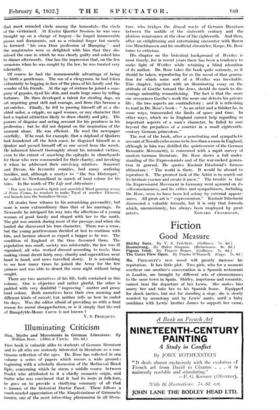Illuminating Criticism
Men, Myths and Movements in German Literature. By William Rose. (Allen & Unwht. 10s. fid.) Tins hook is valuable alike to-students of German literature 'and to all who are seriously interested in literature as a con- tinuous:reflection of the ages. Dr. Rose has collected in one volume a series of Papers which covets a wide ground : beginning with a scholarly discussion of the Mediaeval Beast Epic, concerning which he steers a middle course between Foulet who attributed to it si -chiefly MonaStic origin, and Satire who was convinced 'that it had its roots in folk-lore, lie gims- on to provide a clarifying summary of all that is known of the historical Dottor Faust. There follows a much-needed appreciation Orate Simplicisifinus'of Grinuriels"- hanks), one of the most interesting plieriorneint in all litera- ture, who bridges the dismal waste of German literature between the middle of the sixteenth century and the glorious renaissance at the close of the eighteenth. And then; after an enlightening and entertaining encounter with Baron von Mfinchhausen and his unofficial chronicler, Rave, Dr. Rose turns to criticism.
His chapter on the historical background of Werther is most timely, for in recent years there has been mm tendency to make light of Werther while retaining a blind adoration of its author. Dr. Rose takes the book quite seriously, as it should be taken, reproducing for us the mood of that genera- tion for which some sort Of a Werther was inevitable. This chapter, together With an illuminating essay on the attitude of Goethe toward the Jews, should do much to dis- courage unhealthy romanticising. The fact is that the more one reverences Goethe's work the more one detests his private life ; the two aspects arc contradictory ; and it is refreshing to read in Dr. Rose's book : "As an artist and a thinker he, in sonic ways, transcended the limits of space and time. In other 'ways, which we in England cannot help regarding as important aspects of a man's character, he failed to soar beyond the prejudices of a courtier in a small eighteenth- century German princedom."
The rest of the book, after a penetrating and sympathetic account of Novalis (who seems to be less than a name in England, although in him was distilled the quintessence of the German Romantic Movement), is concerned with a rapid survey of modem German literature. Dr. Rose shows a full under- Standing of the Expressionists and of the war-racked genera- tion in general. He quotes Kasimir Edschmid's famous ultimatum "The world is there. It would be absurd to reproduce it. The greatest task of the Artist is to search out its intrinsic essence and create it anew." The trouble is that the Expressionist Movement in Germany went aground on its self-consciousness, and its critics and sympathisers, including Dr. Rose, seem to have been led astray by external appear- ances. All great art is " expressionism." Kasimir Edsehmid discovered a valuable formula, but it is only that formula which, unconsciously, has always been employed by great








































 Previous page
Previous page